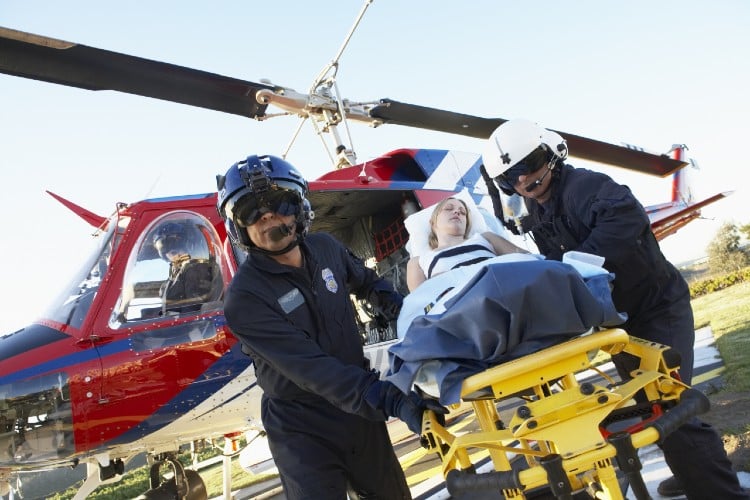 An estimated 85 million Americans live more than an hour from a major hospital, so ground transport is often too slow to save lives. An "air ambulance" is either a helicopter or fixed-wing aircraft that is specially equipped to transport patients from accident scenes and community hospitals to trauma centers in large metropolitan areas.
An estimated 85 million Americans live more than an hour from a major hospital, so ground transport is often too slow to save lives. An "air ambulance" is either a helicopter or fixed-wing aircraft that is specially equipped to transport patients from accident scenes and community hospitals to trauma centers in large metropolitan areas.
Unlike ground EMT vehicles, air ambulance providers are regulated not by health care agencies, but by the Federal Aviation Administration, as authorized by the Airline Deregulation Act of 1978. This law prohibits states from limiting aviation rates, routes and service terms. There are two parts to most air ambulance bills: the lift-off fee and a per-mile charge.
Most of these flights involve Medicare and Medicaid patients and air ambulance providers insist that the reimbursement rates they receive are too low to cover the fixed costs of 24/7 readiness in rural communities. To offset those costs, they often bill private insurers and self-insured companies a higher amount for medical air transport.
A recent Government Accounting Office (GAO) report found that nearly 70% of air ambulance services are out of network for privately insured patients. The study also revealed that private insurers pay an out-of-network median price of about $36,400 for helicopter transport and $40,600 for fixed-wing transport. Most private insurers pay only a portion of those costs and air ambulance providers sometimes balance-bill patients for the remainder.
When recovering patients open an air transport bill that is sometimes larger than the cost of their surgeries, it is a PR nightmare for both private insurers and air ambulance companies. The best way to avoid this problem is to stop the finger-pointing in order to negotiate fairer in-network rates.
What air ambulance providers are facing
Rather than vilify air ambulance companies as price-gougers, it's important to see things from their perspective.
Many rural patients are either on Medicare or Medicaid plans that cover just a small percentage of the cost of medical air transport. Some states reimburse just $200 for each air transport of a Medicaid patient. Moreover, in the last 30 years, about 25% of rural hospitals have closed their doors. This is forcing many air ambulance companies to close bases and halt service in these communities.
To call attention to these problems, air ambulance companies and rural health care providers have created an organization called Save Our Air Medical Resources (SOAR). The group notes that private insurers often deem emergency air transport "not medically necessary" even though it must be authorized by a physician or first responder.
SOAR's stance is that private insurers – not air ambulance providers – are reluctant to negotiate in-network agreements. SOAR feels that a solid first step would be for private insurers to charge members a modest annual fee to cover medical air transport. Studies in several states have found that air ambulance coverage would add less than $2 to each member's monthly premium.
Legislators aim to curtail surprise billing
Balance billing of medical air transport has become the poster child for "surprise billing, something that Congress wants to eliminate. A bill called the Consumer Protections Against Surprise Medical Billing Act is now heading for a vote in the U.S. House of Representatives.
Key provisions of the bill include:
Protection from surprise medical bills for out-of-network services – All providers would be prohibited from balance-billing patients.
New patient protections – If the law is enacted, all patients would receive an advance explanation of benefits that describes which providers would deliver their service or treatment, the cost of services, and provider network status.
Mediated dispute resolution process –If the requested payment amount is not satisfactory, a two-step process would be available to resolve disputes. Either party would be able to open a 30-day negotiation period. If there is no resolution in that time-frame, either party would be able to initiate the mediation process, administered by independent third parties without any affiliation to providers or payers.
Help for uninsured patients or those paying cash – The bill would require providers to share cost estimates with uninsured or cash patients prior to a service or procedure. If the final charge is significantly higher than the estimate, the final payment would be determined through mediation.
A joint statement from the bill's sponsors says that "We recognize that any solution to this [surprise billing] problem touches on every part of our nation's health care system. We want to minimize the burden on patients and keep the dispute resolution process neutral. Our priority throughout the painstaking process of crafting this legislation has been to get the policy right for patients, and we firmly believe that we have done that."
Groups like SOAR feel that a simpler solution would be a bill that mandates price transparency so that all parties could clearly see the fixed costs involved in emergency air transport.
Given the climate on Capitol Hill, now is the ideal time for private insurers and air ambulance providers to begin negotiating in-network agreements. Using a third-party negotiator can often streamline the process. The goal is to reach agreements that are equitable for all parties: payers, providers and patients.
Randy King is president of Healthcare Horizons, headquartered in Knoxville, Tennessee since 1993. The company is one of the nation's leading healthcare claims auditing firms, focused exclusively on self-insured employers.
© 2025 ALM Global, LLC, All Rights Reserved. Request academic re-use from www.copyright.com. All other uses, submit a request to [email protected]. For more information visit Asset & Logo Licensing.







